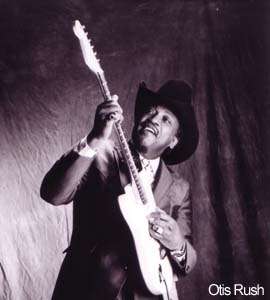Year In Blues Review
During a recent talk at Northwestern University by Israeli professor and musician Karen Alkalay-Gut, the conversation turned to language and perception in poetry and music. Alkalay-Gut teaches Hebrew poetry in English at Tel Aviv University. As the discussion became musical, a British chap in attendance disparaged rock music played in various cultures, claiming it to be unauthentic. He arrogantly intoned, “after all, rock is ours.” I leapt to my feet, removed a shoe and banged it on the table.
The shoe incident didn’t happen (non-boomers, refer to Nikita Khrushchev at the UN, 1960) but the rest is true. I responded heatedly to the British fellow’s claim by invoking the names of Little Richard, Chuck Berry, and Bo Diddley. He further dug himself into a hole when he replied, “Well, the blues had a baby . . .” that baby being “rock ‘n’ roll,” not “rock.” Semantics aside, Alkalay-Gut’s talk evoked the way music is perceived across cultures. It made me think about the current state of the blues, and how cultural perceptions are literally changing the face of the genre.
When it comes to the blues, race is an inevitable factor. Whites perceive it one way, blacks another. I witnessed a living, breathing example of this about 20 years ago when I first came to Chicago. Hanging out at B.L.U.E.S. one night, I caught a set by the late West Side guitarist Johnny Dollar, a bluesman who was equally versed in soul and R&B. I noticed when he played 12-bar blues, the whites in the audience responded enth-usiastically. When he played soul and R&B tunes, the blacks responded the same way. It was that cut and dry.
Chicago blues, once the standard of blues players and fans everywhere, has taken a hit in the past few years. The search for “authentic” Chicago blues has been abandoned as one generation replaces another, causing industry types to look elsewhere. The new breed of younger, educated, and more accomplished black musicians who were nurtured in the blues, but raised in the exciting era of soul, funk, R&B, and rock, are finding themselves shut out by an industry that caters increasingly to white blues and roots artists.
Nine of Blind Pig Records’ 11 releases in 2007 were by white artists like the Australian didgeridoo musician Harper, roots rockers Hamilton Loomis and Peter Karp, and blues rockers Popa Chubby, Dave Hole, and Tommy Castro. Alligator is promoting Florida roots rockers, JJ Grey And Mofro and rockabilly (and former Stray Cats) bassist Lee Rocker. Germany’s Ruf Records features Canadian singer/guitarist Roxanne Potvin and Canned Heat among its new releases, and Telarc has just released a new Debbie Davies CD. Stalwarts Nappy Brown (Blind Pig) and Koko Taylor (Alligator) have new CDs out this year, and Alligator has just signed guitarist Eddy Clearwater, but missing in action is a wealth of home-grown talent rendered invisible by the powers that be, who have set standards based on their perceptions of how the blues should be.
THE BEST: Following is a list of my 10 favorite records from 2007, in no particular order.
Otis Taylor, Definition Of A Circle (Telarc)
Lurrie Bell, Let’s Talk About Love (Aria B.G. 1 – see cover story)
Eric Bibb, An Evening With Eric Bibb (M.C.)
Koko Taylor, Old School (Alligator)
Robben Ford, Truth (Concord)
The Soul Of John Black, The Good Girl Blues (Yellow Dog)
Barrelhouse Buck McFarland, Alton Blues (Delmark)
Jimmy Burns, Jimmy Burns: Live At B.L.U.E.S. (Delmark)
Elvin Bishop, Booty Bumpin’ (Blind Pig)
Eric Davis And The Troublemakers, Here Comes Trouble (Young Blues)
TOP FIVE DVDS:
Son Seals, A Journey Through The Blues: The Son Seals Story (Vizztone)
North Mississippi Allstars, Keep On March-in’: Live In Burlington VT (Songs Of The South)
Lurrie and Carey Bell, Gettin’ Up: Live At Buddy Guy’s Legends, Rosa’s, And Lurrie’s Home (Delmark)
Jeff Healey, The Jeff Healey Band: Live At Montreux 1999 (Eagle Vision)
Various Artists, The American Folk-Blues Festival: The British Tours, 1963-1966 (Hip-O)
AIN’T THAT GOOD NEWS: Legendary bluesman Otis Rush was in his hometown of Philadelphia, Mississippi in December to witness the unveiling of a marker in his honor on the Mississippi Blues Trail. Sponsored by the Mississippi Blues Commission, the Blues Trail will eventually be composed of more than 100 historical markers and interpretive sites located throughout the state. The homecoming was an emotional one for Rush, who was accompanied by his wife Masaki, daughter Lena, and granddaughter Naima. Rush has been confined to a wheelchair since suffering a stroke four years ago, but according to Masaki, he is in good overall health and working toward recovery. During the ceremony Masaki received a call from Otis’ manager, who informed her Otis had just been nominated for a Grammy in the Best Traditional Blues category for Live . . . And In Concert From San Francisco, Otis Rush (Blues Express). Congratulations Otis!

Also nominated for the Best Traditional Blues Grammy are Koko Taylor, Pinetop Perkins, David “Honeyboy” Edwards, and Kenny Wayne Shepherd. Congratulations all!
SAYING SO LONG: The worldwide blues community mourned the deaths of the following people in 2007: Edward “Blues Eddie” Berner, harpist Gary Primich, New Orleans drummer Nathaniel Jollivette, legendary harpist Carey Bell, photographer Susan Greenberg, vocalist Leroy Brown, and vocalist/songwriter Johnnie Mae Dunson. May they all rest in peace.
Category: Columns, Monthly, Sweet Home












this was very well written and makes some valid points.I really enjoy this columns and I will keep reading them!
james in Detroit